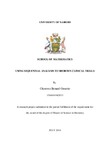| dc.description.abstract | Sequential analysis is concerned with the statistical theory and methods of analysis of such data in which the final number of observations need not to be fixed in advance but may depend in some specified way on the data themselves as they become available. One way to sufficiently utilise sequential analysis is using triangular test approach to shorten clinical trials. A situation of accumulation allows analysis of the data as they accumulate and stop the trial as soon as superiority of one or other treatment is established.
The statistical analysis should meet the following ethical requirements
i. If a larger treatment difference becomes apparent during the course of the study, then the study will stop.
ii. If no treatment difference is observed, the trial will continue to its maximum sample size.
iii. The assumptions of the study is that the new treatment will be found to be more efficacious compared to control (standard) treatment. A bio equivalence study gives the hope that the new treatment will have equivalent therapeutic value such that its advantage may lie elsewhere perhaps it is cheaper to produce, easy to administer or fewer unpleasant side effects. | en_US |

